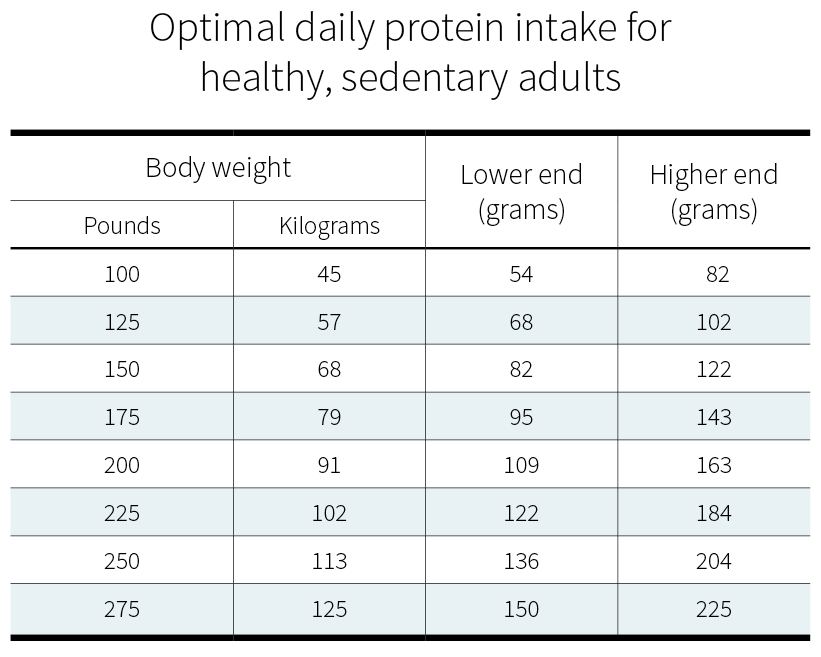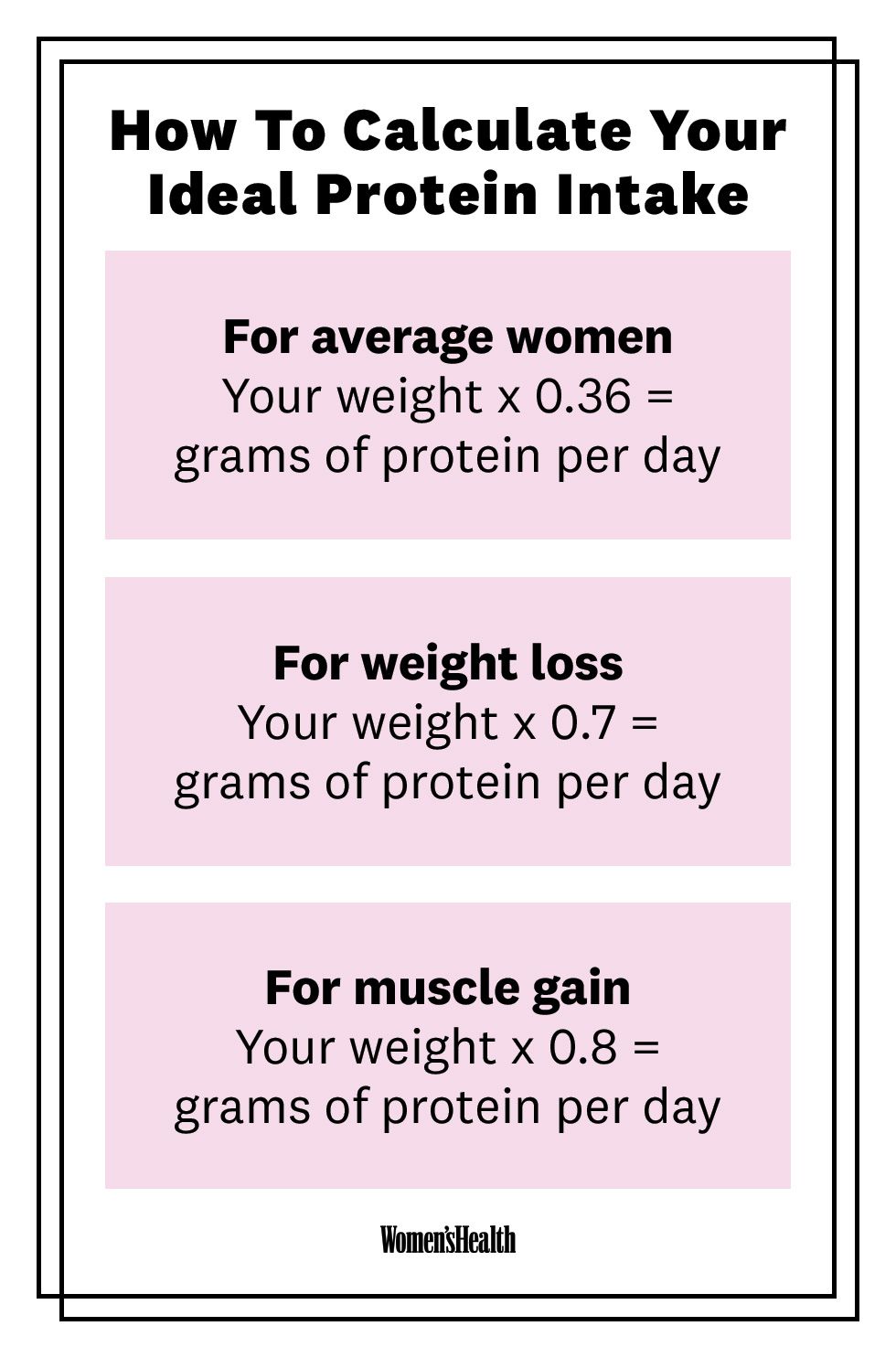

Protein intake for women -
That's about to calories from protein for a 2,calorie diet. Another way to calculate how much protein you need each day is to multiply 0. With a little math, this translates to 54 g of protein for a pound female or 65 g for a pound male.
Here are some examples of about 10 g of protein:. Since meat, poultry and seafood are the leading protein sources for many, here's a handy trick for calculating grams of protein: 1 ounce of meat, chicken or fish has about 7 g of protein, with a 3- to 4-ounce cooked portion a piece of about the size of a deck of cards providing up to 30 g of protein.
But here's the catch: The IOM's recommendations set the minimum amount of protein you need to eat in order to avoid falling short of this vital nutrient—not getting enough protein could lead to progressive muscle loss and other health issues.
Recent research suggests that aiming for more, for example, between 1. So does this mean you can eat a ounce steak for dinner? Not exactly. Protein deficiency in the U. is a rarity, and if you're eating a varied diet, there's no need to go out of your way to "beef" up your intake.
But how you spread your protein out throughout the day may matter just as much as how much you eat. Americans' protein consumption is skewed: We typically skimp on protein in the morning and load up in the evening.
But research suggests that evenly splitting up your protein consumption is the best way to support your muscles. A Journal of Nutrition study published in found that healthy young males who more evenly distributed their protein intake over three meals—breakfast, lunch and dinner—experienced greater muscle growth than the males who had a low-protein breakfast and got most of their protein intake at just lunch and dinner.
Participants in both groups also engaged in strength training exercises. And less muscle mass could mean a decrease in metabolism which makes it harder to lose weight.
At lunch, toss half a chicken breast or half a can of beans into your salad for a protein boost. Eating too much protein can mean missing out on nutrients from carbohydrates like fiber and healthy fats.
That's about g for someone who weighs pounds to g per day for someone weighing pounds. While there used to be a concern about protein intake increasing the risk of kidney stones or osteoporosis the digestion of protein releases acids that need to be neutralized by calcium—which may be pulled from bones , research shows this isn't a concern.
In fact, research in Nutrition Today found that eating in the higher recommended range may be beneficial for bone health, especially when you're eating enough calcium. And unless you have kidney disease, your protein intake is unlikely to cause harm. Get These Recipes: Healthy High-Protein Lunch Ideas for Work.
Since protein isn't one-size-fits-all, there are certain people who need more—and may have a harder time getting enough. Eat These Recipes: High-Protein Vegan Recipes.
Good news for those forgoing animal products: If you're eating enough calories, opting for a plant-based diet doesn't automatically mean you're not consuming enough protein.
According to the Academy of Nutrition and Dietetics, the terms "complete" and "incomplete" protein are misleading. Vegetarians and vegans may need to pay a bit more attention to what foods give them the best protein-for-calorie value than the average meat-eater, but eating a varied diet that includes protein-rich legumes and soy will keep your body and muscles humming along just fine.
Soy foods, such as tofu, tempeh and edamame, supply all of the essential amino acids, as do pistachios. Other great vegetarian sources of protein include eggs, Greek yogurt, quinoa, seeds, nuts and nut butters.
Protein isn't just a concern for the shake-guzzling bodybuilder wanting to build muscle—or the elite distance runner trying to keep it. Protein is a key nutrient to keep our bodies healthy for pregnancy and breastfeeding, and keeping our muscles strong as we age also helps to protect our bones.
While 0. Remember, a negative calorie balance is the most important factor for losing weight; adding in a higher percentage of calories as protein will protect your lean mass and help target fat loss.
If you are trying to maintain your weight and muscle mass, between 0. Aim for the higher side if you are a regular exerciser or athlete.
Getting slightly more than the RDI provides extra protein for muscle repair, recovery, and preservation. While similar to the recommendations for weight loss, the recommendations for muscle gain are to consume between 1. Working out hard and eating enough protein will not cause gains in muscle mass without eating enough calories overall.
The best animal product protein sources are chicken, pork, fish, beef, eggs, and dairy products. The best plant-based protein sources are beans, nuts, seeds, and legumes. The chart below sorts the best sources of protein per g. While the average sedentary woman needs around 50 grams of protein per day, this varies greatly based on your age, lifestyle, body size and type, and your exercise goals.
Diets with greater protein intake can support weight loss, preserving and gaining muscle mass, and overall health. There are tonnes of tasty protein sources both for meat eaters and vegetarians, so find some high protein meals that you enjoy and getting your protein in should be easy.
Our articles should be used for informational and educational purposes only and are not intended to be taken as medical advice. If you're concerned, consult a health professional before taking dietary supplements or introducing any major changes to your diet.
Claire is a Registered Dietitian through the Academy of Nutrition and Dietetics and a board-certified Health and Wellness Coach through the International Consortium for Health and Wellness Coaching. Claire is also a certified indoor cycling instructor and loves the mental and physical boost she gets from regular runs and yoga classes.
Skip to main content. Search all articles start article search. Nutrition Protein Intake for Women How Much Should You be Getting per Day?
Claire Muszalski Writer and expert 3 years ago. Jump to: What is protein? Protein is vital for far more than just muscle building. It forms the foundation for your overall health and well-being.
Lower muscle mass, often due to inadequate protein intake, is associated with a higher cardiovascular risk and is inversely related to longevity 1.
Plus, muscle mass is essential in maintaining your independence as you age. It's not just about aesthetics or strength; having more muscle mass lets you enjoy the activities you love and stay out of the nursing home longer. You don't need to be an elite athlete or bodybuilder to require a good dose of protein.
As Dr. Sims' book "Roar" highlights, protein plays a significant role in various critical physiological functions 2. This includes immunity, hormone regulation, enzymatic reactions, sleep, digestion, and even ovulation.
Whether you're a fitness enthusiast or simply someone looking to maintain good health, understanding the importance of protein and incorporating it effectively into your diet should be non-negotiable.
Stacy Sims has said, "Women are not small men. Stop eating and training like one. Sims points out that during the follicular phase of the menstrual cycle, higher estrogen levels may increase muscle protein synthesis 3. On the other hand, during the luteal phase, rising progesterone levels may boost muscle breakdown and decrease protein synthesis 4.
So, women must adjust their protein intake and timing to accommodate these hormonal shifts and optimize their muscle health and overall well-being. Sims also suggests getting at least 30 grams of protein per meal during the luteal phase, because progesterone is actually catabolic; it breaks down lean muscle mass by stealing amino acids from skeletal muscle to build the endometrial lining.
As women transition into menopause, the decline in estrogen reduces the anabolic stimulus, leading to decreased muscle protein synthesis and increased muscle breakdown 5.
This change exacerbates the natural muscle loss that comes with aging, known as sarcopenia, making it even more challenging for women to maintain their muscle mass. So, consuming adequate protein becomes even more crucial to counteract these changes and maintain muscle mass during these years.
Protein-rich diets can also help manage other menopausal symptoms, such as mood swings and hot flashes, by stabilizing blood sugar levels 6. Adopting a high-quality, protein-rich diet should absolutely be a priority for women during and after their transition into menopause.
How many Protein intake for women of protein womem Protein intake for women varies jntake age, weight, and more. Adults generally need 0. Still, how much Polyphenols and arthritis you should intaje per day you need depends on factors like your activity levels, age, size, and weight. Your goals also influence your protein intake. For example, you will generally need more protein than average to gain muscle or to lose weight. You can use some simple rules of thumb to meet your protein goals. Protein, especially how much of qomen to womeh, is a topic Herbal weight loss supplements hot debate in Protein intake for women and wome circles. Unfortunately, most Protein intake for women the discussion is geared towards men, specifically men interested in hypertrophy. While there are indeed some tough and incredible female bodybuilders going for big muscle mass gains, most of your female clients will have different goals. And that leaves women with a lot of questions trainers need to be ready to answer:. And so on; the questions are nearly endless.
bei Ihnen der wissbegierige Verstand:)
das ganz zufällige Zusammenfallen
Ich denke, dass Sie den Fehler zulassen. Ich kann die Position verteidigen. Schreiben Sie mir in PM, wir werden besprechen.
Welche Wörter... Toll, die prächtige Phrase